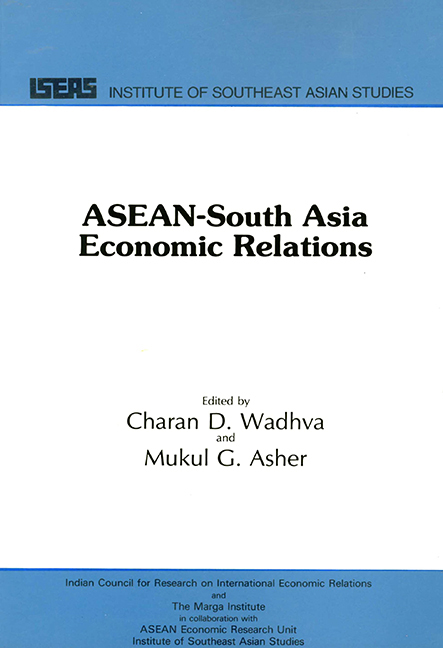Book contents
- Frontmatter
- Contents
- Foreword
- Exchange Rates of ASEAN and South Asian Countries
- An Overview
- PART ONE ASEAN COUNTRY STUDIES
- Economic Relations between Indonesia and South Asia
- Malaysia-South Asia Economic Relations: A Preliminary Study
- Philippine-South Asia Economic Relations
- Economic Relations between Singapore and South Asia
- Economic Relations between Thailand and South Asia
- PART TWO SOUTH ASIA COUNTRY STUDIES
- Postscript
- Appendix SITC Classification at One-, Two-, and Three-digit Levels
- THE EDITORS
Economic Relations between Indonesia and South Asia
from PART ONE - ASEAN COUNTRY STUDIES
Published online by Cambridge University Press: 21 October 2015
- Frontmatter
- Contents
- Foreword
- Exchange Rates of ASEAN and South Asian Countries
- An Overview
- PART ONE ASEAN COUNTRY STUDIES
- Economic Relations between Indonesia and South Asia
- Malaysia-South Asia Economic Relations: A Preliminary Study
- Philippine-South Asia Economic Relations
- Economic Relations between Singapore and South Asia
- Economic Relations between Thailand and South Asia
- PART TWO SOUTH ASIA COUNTRY STUDIES
- Postscript
- Appendix SITC Classification at One-, Two-, and Three-digit Levels
- THE EDITORS
Summary
INTRODUCTION
Recent empirical studies have shown that exports from the developing countries are not wholly dependent on the growth and trade policies of the industrialized countries. Since 1973, trade among the developing countries has shown an increasing trend. With the recent accent on collective self-reliance in the “South”, an attempt has been made in this study to put together the existing empirical evidence to measure the strength of economic relations between Indonesia and South Asia. More specifically, the survey has been carried out in the broader perspective of economic relationships by examining the flows of capital and services between Indonesia and South Asia as well as the flows of commodity trade. Throughout the study, time series data covering the period from 1970/71 to 1979 have been used. These data were predominantly collected from Indonesian sources, as the study concerns Indonesia's economic relationships with South Asia.
The following section briefly describes the general characteristics and the overall growth performance of the economies of Indonesia and South Asia. The rate of growth of gross domestic product (GDP) in constant prices has been used as a measure of overall performance. The second section measures the strength of economic ties between Indonesia and South Asia in terms of commodity trade. These links are examined by calculating the export intensity index, import intensity index, and Grubel-Lloyd index. The third section reviews the trend of capital flow between Indonesia and South Asia in terms of investment and joint ventures. The following section describes the links between Indonesia and South Asia in terms of the movement of people as tourists, and other cultural and social organizations. The last section brings together the summaries of the earlier sections and suggestions for further strengthening the economic relations between Indonesia and South Asia.
It may be worthwhile to begin the discussion with some salient economic features of Indonesia and South Asia. Until recently, the World Bank had classified Indonesia, Bangladesh, India, Nepal, Pakistan, and Sri Lanka as low-income developing countries with per capita gross national product (GNP) of US$370 or below in 1979.
- Type
- Chapter
- Information
- ASEAN-South Asia Economic Relations , pp. 29 - 65Publisher: ISEAS–Yusof Ishak InstitutePrint publication year: 1985



